Malcolm R. Campbell's Blog, page 229
March 29, 2013
Briefly Noted: ‘Butterfly Moon,’ by Anita Endrezze
“Endrezze is adept at making her settings and landscape reflective of what is happening in the psyches of her characters and the situations of their lives. She captures her reader with vivid language and some very unique and startling images.” – M. Miriam Herrera
“When I first found Anita Endrezze’s poems, I felt I had come home. Here was the passion, the eloquence, the originality, the insistent song, that I longed to find. But how could I feel so at home? Endrezze is half-West European, half-Yaqui, her origins, her culture, so far from mine.” – Leah Shelleda
 What we are drawn to, in part when landscapes and psyches are merged, in part when there is a persistent original song, are ideas and images that speak truth to us even though we’re on vastly different temporal world paths than the authors of the poems and stories.
What we are drawn to, in part when landscapes and psyches are merged, in part when there is a persistent original song, are ideas and images that speak truth to us even though we’re on vastly different temporal world paths than the authors of the poems and stories.
When a read the selection of Endrezze’s poems included in Shelleda’s deep-ecology friendly collection, The Book of Now: Poetry for the Rising Tide, I, too, felt at home within Endrezze’s words. I looked for more of them because they seemed essential. I’m pleased to say that I found them in multiple places, and for a lover of myths and folktales, best of all in her Butterfly Moon collection of short stories.
The world turns, for some of us, where myth and landscape meet, where worlds merge and where tricksters often command the seasons. Trena Machado put this well in her New Pages review of Butterfly Moon:
“In the mythic way of seeing, there is the archaic layer of our anthropomorphizing nature and the earth that we have lost in our Western culture of commerce and science as we strain the limits of the earth’s balance. Nature has its-own-life-to-itself for which we were once more attuned, held reverence and enlivened by: ‘The house was a forest remembering itself. The pine trees that held up the walls dreamed of stars dwelling in their needles. Jointed, branched, rooted, the trees still listened to the wind.’”
The University of Arizona Press blurb is right when it says that Anita Endrezze’s stories are “Enjoyably disturbing, these stories linger—deep in our memory.” This 160-page book was published last September at a time when industrial excesses and environmental concerns occupied much of our attention, if not our overt commitment. No, this is not a Sierra Club tract; it’s pure storytelling at a time when, in addition to the joys of reading, we need to be disturbed and otherwise shaken up.


March 27, 2013
On Location: Longleaf Pine along the Florida coast

97% of this forest is gone, leaving only isolated pockets of longleaf pines
“The average American’s view of the natural communities of the Southeastern U.S. is that it is comprised mainly of swamps, alligators and big, old moss-hung cypress trees. On the contrary to this view, when early explorers visited the southeastern region they saw “a vast forest of the most stately pine trees that can be imagined, planted by nature at a moderate distance. . . enameled with a variety of flowering shrubs.” Fire defined where the longleaf pine forest was found and fostered an ecosystem diverse in plants and animals.” – Longleaf Alliance
I have been working on another short story for my evolving “Land Between the Rivers” collection about the animals who lived along the Florida Gulf Coast before man showed up and who are now endangered species.
These stories are set in what is now called “Tate’s Hell Forest,” a diverse habitat along the gulf coast near the mouth of the Apalachicola River. This mix of swamps and wet prairies and mixed forests used to flow into the continuous longleaf pine forests as shown on the map.
Why I Like the Setting

When men came, the found a forest they could drive their wagons through. – Longleaf Alliance Photo
The endangered gopher tortoise, the main character in my current story, loves sandy areas for creating its underground burrows and depends on the grasses and other plants the grow on the floor of a well-maintained longlreaf pine forest. Unlike hardwood and mixed forests, longleaf forests feature widely spaced trees with minimal brambles, mid-level trees and shrubs. These forests are maintained by natural fires that roar through and clean away the clutter that would eventually destroy the forest.
The den of a gopher tortoise is great protection against such fires, fires that often run through quickly without burning as hot as summer fires in hardwood forests, especially where brush has built up.
In addition to logging off most of the longleafs and replanting with slash pines and loblolly pines, many don’t understand the need for fires and tend to put them out before they do what nature intended.
Fortunately, enlightened forest management specalists are showing show landowners, as well as active forest companies, the value of these trees, not only commercially as tree farms, but for the environment as well. Click here if you live in the Southeastern United states and would like to visit a longleaf pine forest park or recreation area near you.
Realism and Magic Together
 According to Seminole legends, the Earth’s animals emerged from the Creator’s birthing shell in a specific order long before man arrived. My stories about the animals of this time focus on their learning what their living place is all about—what to eat, how to find shelter, how to raise their young. I mix my talking animals out of myth with settings as realistic as I can make them. So now I’m studying the tortoise’s habitat.
According to Seminole legends, the Earth’s animals emerged from the Creator’s birthing shell in a specific order long before man arrived. My stories about the animals of this time focus on their learning what their living place is all about—what to eat, how to find shelter, how to raise their young. I mix my talking animals out of myth with settings as realistic as I can make them. So now I’m studying the tortoise’s habitat.
Every time I pick a new animal and a somewhat new habitat, I have a good excuse for learning more about the Florida world where I grew up. I started writing these stories when several sequences in my upcoming novel The Seeker were set here and I fell in love with the place all over again.

Coming March 2013


March 24, 2013
Novelist Returns to Nonfiction with Patton’s Oracle Memoir
 Today’s guest post is by Robert Hays (“Blood on the Roses,” “The Life and Death of Lizzie Morris”) who returns to his nonfiction roots with Patton’s Oracle: Gen. Oscar Koch, as I Knew Him. Since my writing career also began, like my father’s and Robert Hays’, in journalism, I wondered how Robert handled the move from fiction to nonfiction for this book.
Today’s guest post is by Robert Hays (“Blood on the Roses,” “The Life and Death of Lizzie Morris”) who returns to his nonfiction roots with Patton’s Oracle: Gen. Oscar Koch, as I Knew Him. Since my writing career also began, like my father’s and Robert Hays’, in journalism, I wondered how Robert handled the move from fiction to nonfiction for this book.
Returning to Nonfiction
After four novels, I returned to non-fiction for my new book, Patton’s Oracle: Gen. Oscar Koch, as I Knew Him. I love writing fiction—the freedom to create settings and characters, the magic of working with different plots, the fun of trying ideas just to see if they work—but I also find great satisfaction in non-fiction. I’ve spent most of my adult life as a journalist. I loved newspaper reporting and the prospect of offering readers factual information that I consider interesting and important never wears thin.
 What’s new for me in Patton’s Oracle is the addition of subjective material to the mix. The book is a biographical memoir, my effort to recount a marvelous four years of friendship and work with Oscar Koch, an unsung hero of World War II who became my personal hero as well.
What’s new for me in Patton’s Oracle is the addition of subjective material to the mix. The book is a biographical memoir, my effort to recount a marvelous four years of friendship and work with Oscar Koch, an unsung hero of World War II who became my personal hero as well.
Oscar Koch was a brilliant intelligence officer who deserves great credit for his behind-the-scenes role in the success of his celebrated commander, Gen. George S. Patton Jr. My military service had been two years as a draftee enlisted man and I had just turned 31 when I met Gen. Koch, who besides having a distinguished military career of almost forty years was well beyond twice my age. Surely the likelihood of us finding things in common was slight. But we live in a world of chance and in this case the unlikely came to pass.
I discovered the general to be a modest, scholarly and charming man. He found no glory in war, and sought none for himself. He was not enthusiastic when I asked to make him the subject of a personality profile article for the St. Louis Post-Dispatch. I believe he consented principally as a favor to me. He was pleased with the article, though, and invited me to collaborate with him on a book that had become his final goal in life.
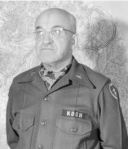 Gen. Koch was a joy to work with. His book quickly became almost as important to me as it was to him. But shortly after we began, he was diagnosed with terminal cancer. From that point forward I knew this was a race against time. We finished the book, G-2: Intelligence for Patton, but Oscar Koch did not survive to see it published. It came out in 1971 and still is in print.
Gen. Koch was a joy to work with. His book quickly became almost as important to me as it was to him. But shortly after we began, he was diagnosed with terminal cancer. From that point forward I knew this was a race against time. We finished the book, G-2: Intelligence for Patton, but Oscar Koch did not survive to see it published. It came out in 1971 and still is in print.
As I summarized this experience in Patton’s Oracle: “I was granted only four years to share life with the general, a period that was far too short. In the beginning he lifted my spirits as we joined in a common purpose. In the end, I endured the anguish of watching an insidious cancer purloin the life from his body even though he never would surrender his gallant spirit. But what a remarkable four years it was, how grateful I am to have had that privilege.”
Patton’s Oracle is my tenth book. But it is the one I’ve wanted for decades to write, timid that I might not do justice to the subject. Even though the words are my own, there are passages that bring tears to my eyes. And of the ten, it is the book that is dearest to my heart.
-
You can find Robert Hays on the web on WordPress and on Facebook.


October 3, 2012
I've Moved to WordPress
You can now find the blog here.
Thanks for reading my posts on this blog for the last eight years.
Malcolm
BOOK BITS Links: Real Tom Sawyer, Calvin Trilling, 'Midnight in Peking'
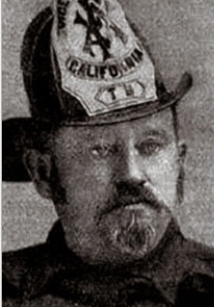 Tom Sawyer - LOC PhotoNews: Humorist Calvin Trillin wins Thurber Prize - "A collection of humorist Calvin Trillin's writings called "Quite Enough of Calvin Trillin: Forty Years of Funny Stuff" has won the Thurber Prize for American Humor." Associated Press News: New book battles tiger mom syndrome with laughs, by Leanne Italie – “One mom lured her daughter to bed — at age 8 — with a trail of chocolate chips up her townhouse stairs. Another found herself on the floor of a plane screaming ‘Save the Jelly Bellys!’ They spilled as she fed them to her preschooler to fend off in-flight earache meltdowns." “Shitty Mom” is the unofficial companion to last year’s “Go the (Bleep) to Sleep.” - Associated Press News: B&N Removing Marshall Title - "Barnes & Noble has told any of its stores that have stocked Penny Marshall’s My Mother Was Nuts to remove the book from shelves. B&N has a corporate policy to not carry physical copies of books acquired by Amazon Publishing in its stores." Publishers Weekly Feature: The Adventures of the Real Tom Sawyer, by Robert Graysmith - "Mark Twain prowled the rough-and-tumble streets of 1860s San Francisco with a hard-drinking, larger-than-life fireman." Smithsonian Review: ‘Midnight in Peking’ by Paul French, reviewed by Janice Harayda - "Midnight in Peking tells such good story that you wish could believe all of it. The book seems at first to be a straightforward history of a sadistic crime: On a frigid January day in 1937, someone murdered a 19-year-old Englishwoman and left her mutilated body, clad in a tartan skirt and a platinum-and-diamond watch, at the foot of a Peking watchtower. A ghastly detail stood out: The body had no heart, which had disappeared along with several of its other internal organs." One-Minute Book Reviews Viewpoint: 11 Things Not to Do Before Your Book Launch, by M. J. Rose - "Sometimes what you mustn't do is just as just as important as what you must do." The Huffington Post Feature: Gems from the Internet Archives, courtesy of the University of Florida - "Today’s find was a collection of several hundred books from the 1940s, 1950s, and 1960s scanned and uploaded to the archive courtesy of the George A. Smathers Libraries of the University of Florida, with the help of Lyrasis and the Sloan Foundation. I’ve had to accept that I will never manage to read everything I’ve discovered so far, let alone what remains to be found, so I can only offer the following as possibilities for others to try. The Neglected Books Page Review: Sutton, by J. R. Moehringer, Reviewed by Stuart Shiffman - "J. R. Moehringer’s SUTTON is a fictionalized account of the life of the legendary thief told through his own words as he travels around New York City immediately after his release from prison. The fictional Sutton is met at the prison walls by a newspaper reporter and photographer. While the Christmas meeting did in fact take place, the actual newspaper account was not memorable. Moehringer takes the premise of the interview to a higher level, mixing fact and legend to create a vivid portrait of a master criminal recounting his life in poignant detail to the two newsmen." Bookreporter How To: Purposes for Connecting Words into Story, by Beth Hill - "Word choice makes stories unique. A dozen stories about a boy running off to war, each with perfect grammar and punctuation, will sound and feel different. Not only because of plot events and characters, but because of the words used to tell the story." The Editor's Blog Interview: Visit With Malcolm R. Campbell author of “Moonlight and Ghosts," with Charmaine Gordon - "While the story unfolded without specific plan (as always), three things helped pull it together: (a) a nod to James Joyce, (b) personal knowledge of Tallahassee and North Florida, and, (c) my work in a developmental center years ago." Bestseller List (September 27, Hardcover Fiction):Winter of the World, Ken Follett; Gone Girl, Gillian Flynn; Telegraph Avenue, Michael Chabon; A Wanted Man, Lee Child; This Is How You Lose Her, Junot Diaz; The Time Keeper, Mitch Albom; NW, Zadie Smith; Where'd You Go, Bernadette, Maria Semple; A Dance With Dragons, George R.R. Martin; The Yellow Bird, Kevin Powers. NPR
Tom Sawyer - LOC PhotoNews: Humorist Calvin Trillin wins Thurber Prize - "A collection of humorist Calvin Trillin's writings called "Quite Enough of Calvin Trillin: Forty Years of Funny Stuff" has won the Thurber Prize for American Humor." Associated Press News: New book battles tiger mom syndrome with laughs, by Leanne Italie – “One mom lured her daughter to bed — at age 8 — with a trail of chocolate chips up her townhouse stairs. Another found herself on the floor of a plane screaming ‘Save the Jelly Bellys!’ They spilled as she fed them to her preschooler to fend off in-flight earache meltdowns." “Shitty Mom” is the unofficial companion to last year’s “Go the (Bleep) to Sleep.” - Associated Press News: B&N Removing Marshall Title - "Barnes & Noble has told any of its stores that have stocked Penny Marshall’s My Mother Was Nuts to remove the book from shelves. B&N has a corporate policy to not carry physical copies of books acquired by Amazon Publishing in its stores." Publishers Weekly Feature: The Adventures of the Real Tom Sawyer, by Robert Graysmith - "Mark Twain prowled the rough-and-tumble streets of 1860s San Francisco with a hard-drinking, larger-than-life fireman." Smithsonian Review: ‘Midnight in Peking’ by Paul French, reviewed by Janice Harayda - "Midnight in Peking tells such good story that you wish could believe all of it. The book seems at first to be a straightforward history of a sadistic crime: On a frigid January day in 1937, someone murdered a 19-year-old Englishwoman and left her mutilated body, clad in a tartan skirt and a platinum-and-diamond watch, at the foot of a Peking watchtower. A ghastly detail stood out: The body had no heart, which had disappeared along with several of its other internal organs." One-Minute Book Reviews Viewpoint: 11 Things Not to Do Before Your Book Launch, by M. J. Rose - "Sometimes what you mustn't do is just as just as important as what you must do." The Huffington Post Feature: Gems from the Internet Archives, courtesy of the University of Florida - "Today’s find was a collection of several hundred books from the 1940s, 1950s, and 1960s scanned and uploaded to the archive courtesy of the George A. Smathers Libraries of the University of Florida, with the help of Lyrasis and the Sloan Foundation. I’ve had to accept that I will never manage to read everything I’ve discovered so far, let alone what remains to be found, so I can only offer the following as possibilities for others to try. The Neglected Books Page Review: Sutton, by J. R. Moehringer, Reviewed by Stuart Shiffman - "J. R. Moehringer’s SUTTON is a fictionalized account of the life of the legendary thief told through his own words as he travels around New York City immediately after his release from prison. The fictional Sutton is met at the prison walls by a newspaper reporter and photographer. While the Christmas meeting did in fact take place, the actual newspaper account was not memorable. Moehringer takes the premise of the interview to a higher level, mixing fact and legend to create a vivid portrait of a master criminal recounting his life in poignant detail to the two newsmen." Bookreporter How To: Purposes for Connecting Words into Story, by Beth Hill - "Word choice makes stories unique. A dozen stories about a boy running off to war, each with perfect grammar and punctuation, will sound and feel different. Not only because of plot events and characters, but because of the words used to tell the story." The Editor's Blog Interview: Visit With Malcolm R. Campbell author of “Moonlight and Ghosts," with Charmaine Gordon - "While the story unfolded without specific plan (as always), three things helped pull it together: (a) a nod to James Joyce, (b) personal knowledge of Tallahassee and North Florida, and, (c) my work in a developmental center years ago." Bestseller List (September 27, Hardcover Fiction):Winter of the World, Ken Follett; Gone Girl, Gillian Flynn; Telegraph Avenue, Michael Chabon; A Wanted Man, Lee Child; This Is How You Lose Her, Junot Diaz; The Time Keeper, Mitch Albom; NW, Zadie Smith; Where'd You Go, Bernadette, Maria Semple; A Dance With Dragons, George R.R. Martin; The Yellow Bird, Kevin Powers. NPR
 Book Bits is compiled two to three times a week by Malcolm R. Campbell, author of contemporary fantasy and satire, including the 2013 Pushcart Prize nominated "Jock Talks...Politics"
Book Bits is compiled two to three times a week by Malcolm R. Campbell, author of contemporary fantasy and satire, including the 2013 Pushcart Prize nominated "Jock Talks...Politics""Moonlight and Ghosts" is my new Kindle short story, released by Vanilla Heart Publishing in September.
October 2, 2012
Teaser Tuesday: 'Alexander's Lighthouse'
 Title: Alexander's Lighthouse by Don Westernhaver
Title: Alexander's Lighthouse by Don WesternhaverTeaser Excerpt: "The crowd screamed and trampled each other in the wild panic to escape the wrath of the Roman killing machine. The Free Egypt agitators also fled, discarding weapons in an attempt to blend in with the civilians."
Publisher's Description: In 92 AD, the imperial city of Rome rules Western civilization, but the city of Alexandria Egypt is the unchallenged pinnacle of Western intellectual achievement. Its prestigious Museum and Library are magnets that draw the world’s most important philosophers, mathematicians, astronomers, physicians and geographers. Alexandria also draws a young man named Marco from Corinth, who joins a small team of brilliant engineers working on secret projects. Titus, the Roman Prefect of Egypt, knew Marco’s father so he sponsors the young man, who then promptly falls in love with Titus’ daughter Paula. Populated by native Egyptians, colonized by Greeks, settled by Jewish immigrants, and ruled by the Romans, the huge city of Alexandria is a cultural melting pot that frequently boils over.
Teaser Tuesdays: Teaser Tuesdays is a weekly bookish meme, hosted by MizB of Should Be Reading. Anyone can play along! Just do the following:
Grab your current readOpen to a random pageShare two (2) “teaser” sentences from somewhere on that pageBE CAREFUL NOT TO INCLUDE SPOILERS! (make sure that what you share doesn’t give too much away! You don’t want to ruin the book for others!)Share the title & author, too, so that other TT participants can add the book to their TBR Lists if they like your teasers!Leave a comment and tell me about your Teaser for 10/1/2012!
Malcolm
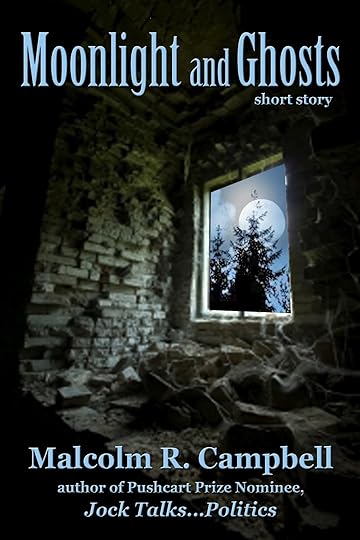 Malcolm R. Campbell is the author of contemporary fantasy novels ("Sarabande" and "The Sun Singer") and the new Kindle paranormal short story, "Moonlight and Ghosts."
Malcolm R. Campbell is the author of contemporary fantasy novels ("Sarabande" and "The Sun Singer") and the new Kindle paranormal short story, "Moonlight and Ghosts."October 1, 2012
BOOK BITS Links: Rowling, Kindle Paperwhite, Tom Angleberger
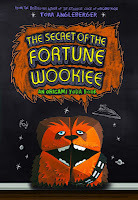 News: Tracking Amazon: Riordan Topples Rowling, "The Casual Vacancy has been knocked off its perch atop Amazon's bestseller list, falling to #2 behind Rick Riordan's The Mark of Athena. Riordan's book, which comes out October 2, has a 3.5 million-copy first printing in the U.S., while The Casual Vacancy has a 2 million-copy run." Publishers WeeklyNews Wrap-Up: Jeffrey Eugenides Discusses Gender Disparity, MacAdam/Cage For Sale, and More, by Evan Smoth Rakoff - Gender in fiction, Rowling's "The Casual Vacancy" and MacAdam/Cage up for sale made the news this past week. Poets & Writers Interview: Benjamin Wood ("The Bellwether Revivals") with Brad Listi on Podcast - "Monologue topics: heat, Austerlitz, industrial warfare, no sleep, Terence McKenna, shamans, hills, mountains, getting ripped to pieces." Other People Feature: Joan Didion, Diane Keaton bring ’60s alive, by Kyle Minor - "The actress narrates an essential new audiobook of "Slouching Towards Bethlehem," which has only deepened with time" SalonNews: The Kindle Paperwhite Is Evidently Amazing, by Adam Clark Estes - "When the press embargo for the Kindle Paperwhite lifted on Sunday night, practically everyone in the tech blogosphere seemed to sing its praises in unison. The new e-reader, now at the bottom end of Amazon's lineup of devices, just got a pretty noticeable facelift with a new front-lit screen, a thinner profile and faster performance." AtlanticHow To: Avoid the self-publishing calamity. Please learn from my mistakes! by Lenore Skomal - "17,500 readers uploaded my Kindle version of Bluff, my debut novel, thanks to the free giveaway promotion KDP Select offers those who wish to sign up. That was the count halfway through day three of the promotion. I wish I could have enjoyed that number. But I couldn’t. I was too busy panicking about the fact that so many people had downloaded an unreadable version of my book." Novel Publicity & Co.Review: Children’s Books: The Secret of the Fortune Wookie by Tom Angleberger, reviewed by Ian Buchsbaum - "Breaking the rule that says the first of a trilogy is the best, the third book the popular Origami Yoda series has come out, and I thought that this was the best one yet!" January MagazineBook Fair: Utah Humanities Book Festival, Salt Lake City, October 1-31 - "This festival is a bit unusual in that it has events all through the month and all over the state. The link above will take you to a page where you click on your area and it displays the list of events and their particular locations. The variety of author readings, talks, presentations, and signings is enormous. Regardless of your interest you’ll find something here." - from BiblioBuffetHow To: Loaded Language, by Mark Nichol - "If your parents brought you up vigilantly, chances are that you were admonished to use your words carefully. As far as writing is concerned, that instruction is one of the most valuable lessons you learned." DailyWritingTipsNews: Eric Hobsbawm obituary, by Eric Hobsbawm obituary - "If Eric Hobsbawm had died 25 years ago, the obituaries would have described him as Britain's most distinguished Marxist historian and would have left it more or less there. Yet by the time of his death at the age of 95, Hobsbawm had a achieved a unique position in the country's intellectual life." The GuardianOdd News: More than any other book, “'Fifty Shades of Grey' was left behind at Travelodge U.K. properties, according to the hotel chain’s annual survey of books left behind." Of the 21,786 books found in the chain's rooms, 7,000 were the popular E. L. James' novel. - Publishing Poynters-
News: Tracking Amazon: Riordan Topples Rowling, "The Casual Vacancy has been knocked off its perch atop Amazon's bestseller list, falling to #2 behind Rick Riordan's The Mark of Athena. Riordan's book, which comes out October 2, has a 3.5 million-copy first printing in the U.S., while The Casual Vacancy has a 2 million-copy run." Publishers WeeklyNews Wrap-Up: Jeffrey Eugenides Discusses Gender Disparity, MacAdam/Cage For Sale, and More, by Evan Smoth Rakoff - Gender in fiction, Rowling's "The Casual Vacancy" and MacAdam/Cage up for sale made the news this past week. Poets & Writers Interview: Benjamin Wood ("The Bellwether Revivals") with Brad Listi on Podcast - "Monologue topics: heat, Austerlitz, industrial warfare, no sleep, Terence McKenna, shamans, hills, mountains, getting ripped to pieces." Other People Feature: Joan Didion, Diane Keaton bring ’60s alive, by Kyle Minor - "The actress narrates an essential new audiobook of "Slouching Towards Bethlehem," which has only deepened with time" SalonNews: The Kindle Paperwhite Is Evidently Amazing, by Adam Clark Estes - "When the press embargo for the Kindle Paperwhite lifted on Sunday night, practically everyone in the tech blogosphere seemed to sing its praises in unison. The new e-reader, now at the bottom end of Amazon's lineup of devices, just got a pretty noticeable facelift with a new front-lit screen, a thinner profile and faster performance." AtlanticHow To: Avoid the self-publishing calamity. Please learn from my mistakes! by Lenore Skomal - "17,500 readers uploaded my Kindle version of Bluff, my debut novel, thanks to the free giveaway promotion KDP Select offers those who wish to sign up. That was the count halfway through day three of the promotion. I wish I could have enjoyed that number. But I couldn’t. I was too busy panicking about the fact that so many people had downloaded an unreadable version of my book." Novel Publicity & Co.Review: Children’s Books: The Secret of the Fortune Wookie by Tom Angleberger, reviewed by Ian Buchsbaum - "Breaking the rule that says the first of a trilogy is the best, the third book the popular Origami Yoda series has come out, and I thought that this was the best one yet!" January MagazineBook Fair: Utah Humanities Book Festival, Salt Lake City, October 1-31 - "This festival is a bit unusual in that it has events all through the month and all over the state. The link above will take you to a page where you click on your area and it displays the list of events and their particular locations. The variety of author readings, talks, presentations, and signings is enormous. Regardless of your interest you’ll find something here." - from BiblioBuffetHow To: Loaded Language, by Mark Nichol - "If your parents brought you up vigilantly, chances are that you were admonished to use your words carefully. As far as writing is concerned, that instruction is one of the most valuable lessons you learned." DailyWritingTipsNews: Eric Hobsbawm obituary, by Eric Hobsbawm obituary - "If Eric Hobsbawm had died 25 years ago, the obituaries would have described him as Britain's most distinguished Marxist historian and would have left it more or less there. Yet by the time of his death at the age of 95, Hobsbawm had a achieved a unique position in the country's intellectual life." The GuardianOdd News: More than any other book, “'Fifty Shades of Grey' was left behind at Travelodge U.K. properties, according to the hotel chain’s annual survey of books left behind." Of the 21,786 books found in the chain's rooms, 7,000 were the popular E. L. James' novel. - Publishing Poynters-BOOK BITS is compiled my Malcolm R. Campbell, author of contemporary fantasy and satire, including the paranormal short story "Moonlight and Ghosts" available at Smashwords and on Kindle.

September 29, 2012
BOOK BITS: Writing Links - Godfather Films, English language weirdness, 'The Black Count'
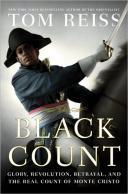 News: Books bloggers are harming literature, warns Booker prize head judge, by Alison Flood - "Peter Stothard, chair of this year's Booker prize judges, says the mass of online opinion about books could kill off literary criticism." The Guardian News: Judge: Paramount Won't Lose Right to Make More 'Godfather' Films, by Eriq Gardner - "A federal judge in New York on Thursday dismissed attempts by the estate of The Godfather author Mario Puzo to cancel a decades-old contract that gave Paramount film rights to his most famous book about a mafia family." The Hollywood Reporter How To: 5 Characters Every Writer Needs to Master, by Ken Myers - "As a writer you know you have the creative ability to write however you want. You are the artist. To challenge your writing and to keep your readers interested, there are five characters all writers should consider including in their stories." Wordplay How To: (Most) Characters Can’t Read Minds, by Beth Hill - "You may be writing paranormals and so, yes, you might have a mind-reading character or two in your fiction. But if you’re not and if you don’t, then it’s likely your characters are no better at reading the minds and emotions of other characters than any of us are at reading the 3-dimensional people in our lives." The Editor's Blog Feature: More on the Weirdness of the English Language, by Smoky Zeidel - "Vernaculata, Goddess of the Vernacular of the Peasantry, is at it again, keeping me awake at night pondering the weirdness of the English language. And it is weird; weird enough to make the savviest of editors (that would be me) tear her hair out at times, trying to figure out what is—and what isn’t—a word." Smoky TalksFeature: Your Secret Story, by Theodora Goss - "A secret story is a story you tell about yourself, as you’re going through your daily life. We probably all had secret stories when we were children. I know I did. I was in disguise as an ordinary student, but I had actually come from fairyland, or the future, or somewhere else, and I was just observing the people around me."Feature: Writers Be-Wary: Distribution and Control of Creative Material - "authors will wish to retain control over their contributions and may find aggregators’ “Terms of Use” unaccommodating. It is a fair question, What does an author give up in exchange for granting a license for the privilege of having her content aggregated with others and accessible to the searching public?" Legal Corner for AuthorsReview: The real-life Count of Monte Cristo, Tom Reiss' review of "The Black Count" by John T. Slania - "he Count of Monte Cristo is a classic tale of betrayal and revenge, penned by the renowned 19th-century author Alexandre Dumas. But it turns out the novel is not merely fiction; key plot developments were based on the true-life experiences of the author’s father." BookPage"Book Bits" is compiled by Malcolm R. Campbell, author of contemporary fantasy, including the heroine's journey novel "Sarabande" and the Kindle short story "Moonlight and Ghosts"
News: Books bloggers are harming literature, warns Booker prize head judge, by Alison Flood - "Peter Stothard, chair of this year's Booker prize judges, says the mass of online opinion about books could kill off literary criticism." The Guardian News: Judge: Paramount Won't Lose Right to Make More 'Godfather' Films, by Eriq Gardner - "A federal judge in New York on Thursday dismissed attempts by the estate of The Godfather author Mario Puzo to cancel a decades-old contract that gave Paramount film rights to his most famous book about a mafia family." The Hollywood Reporter How To: 5 Characters Every Writer Needs to Master, by Ken Myers - "As a writer you know you have the creative ability to write however you want. You are the artist. To challenge your writing and to keep your readers interested, there are five characters all writers should consider including in their stories." Wordplay How To: (Most) Characters Can’t Read Minds, by Beth Hill - "You may be writing paranormals and so, yes, you might have a mind-reading character or two in your fiction. But if you’re not and if you don’t, then it’s likely your characters are no better at reading the minds and emotions of other characters than any of us are at reading the 3-dimensional people in our lives." The Editor's Blog Feature: More on the Weirdness of the English Language, by Smoky Zeidel - "Vernaculata, Goddess of the Vernacular of the Peasantry, is at it again, keeping me awake at night pondering the weirdness of the English language. And it is weird; weird enough to make the savviest of editors (that would be me) tear her hair out at times, trying to figure out what is—and what isn’t—a word." Smoky TalksFeature: Your Secret Story, by Theodora Goss - "A secret story is a story you tell about yourself, as you’re going through your daily life. We probably all had secret stories when we were children. I know I did. I was in disguise as an ordinary student, but I had actually come from fairyland, or the future, or somewhere else, and I was just observing the people around me."Feature: Writers Be-Wary: Distribution and Control of Creative Material - "authors will wish to retain control over their contributions and may find aggregators’ “Terms of Use” unaccommodating. It is a fair question, What does an author give up in exchange for granting a license for the privilege of having her content aggregated with others and accessible to the searching public?" Legal Corner for AuthorsReview: The real-life Count of Monte Cristo, Tom Reiss' review of "The Black Count" by John T. Slania - "he Count of Monte Cristo is a classic tale of betrayal and revenge, penned by the renowned 19th-century author Alexandre Dumas. But it turns out the novel is not merely fiction; key plot developments were based on the true-life experiences of the author’s father." BookPage"Book Bits" is compiled by Malcolm R. Campbell, author of contemporary fantasy, including the heroine's journey novel "Sarabande" and the Kindle short story "Moonlight and Ghosts" A haunting short story for your Kindle
A haunting short story for your KindleSeptember 28, 2012
New Release: 'Moonlight and Ghosts'
 My short story "Moonlight and Ghosts" has been released as a Kindle e-book by Vanilla Heart Publishing. It's also available in multiple formats at Smashwords.
My short story "Moonlight and Ghosts" has been released as a Kindle e-book by Vanilla Heart Publishing. It's also available in multiple formats at Smashwords.Publisher's Description: On a moonlit night, Randy's intuition is drawing him back to an abandoned psychiatric hospital where he once worked. He and his friend, Alice, have heard the ghost hunters' claims the building is haunted, filled with strange lights, apparitions and the voices of former patients calling for help. The Forgotten point Randy and Alice to a crime in progress... and there's not much time to save the victim.
Many years ago, I worked as a unit manager at a center for the developmentally disabled. Unfortunately, my finances wouldn't allow me to stay in such a low paying position for long. When I left, I felt rather guilty about it because I had developed a strong enough rapport with the residence to help them learn daily living skills and, in some cases, become capable of going into sheltered workshops.
In Moonlight and Ghosts, I turned my memories and guilt into a ghost story, complete with an abandoned psychiatric hospital and a crime in progress that the main character needs to figure out.
This is my first release since Sarabande came out during the summer of 2011. It's fun having something new to talk about!
Malcolm
September 27, 2012
BOOK BITS: Writing Links - Rowling, Penguin, Pew News Study
 Welcome to Book Bits, a new feature on this blog which I'll run at least twice a week to bring you some of the latest writing links. You'll find links for news, reviews, how-to articles, features, commentary and opinion. I hope you enjoy the feature and find some fun-filled and helpful sources.
Welcome to Book Bits, a new feature on this blog which I'll run at least twice a week to bring you some of the latest writing links. You'll find links for news, reviews, how-to articles, features, commentary and opinion. I hope you enjoy the feature and find some fun-filled and helpful sources.Here are today's links:
News: Pew Study: Television Top Source of Local News, by Merrill Knox - "Local television had its best showing in suburbs near large cities, where 75 percent of respondents said they watched a local newscast at least once per week. Small towns and rural areas both had 72 percent and urban areas had 65 percent. " TVSPY News: Failed to Deliver Your Book? Penguin Wants its Advance Back, by Dennis Abrams - "The Smoking Gun reports that the Penguin Group has filed lawsuits against several well-known writers, claiming that they 'failed to deliver books for which they received hefty contractual advances.”' Publishing Perspectives Viewpoint: Should we Rethink Pseudonyms? by Rachelle Gardner - "They have a long history in literature and the arts, and even nowadays on the Internet, many people choose to comment on blogs or maintain their Twitter presence under a pseudonym." Books & Such Review: JK Rowling review: 'The Casual Vacancy' breaks Harry Potter's spell, by Allison Pearson – “In 'The Casual Vacancy', JK Rowling bewilders her fans with an uneven, often harrowing book.” The Telegraph Lists: 6 Goofs I Made That Killed My Blog — and Helped Launch My Writing Career, by Carol Tice - "I poured my heart and soul into launching my first blog, and despite my best efforts and intentions, it flopped." Make a Living WritingViewpoint: Amendment I by Nicki Leone - "What is truly amazing about the First Amendment is that it assumes—has faith, really—that we are rational and responsible enough to live in a world where anyone can say what they think. It becomes the responsibility of the individual, not the government, to evaluate, to weigh the evidence, and to come to their own conclusions about what they read and what they hear." BiblioBuffet How To: Writing Scripts and Speeches, by Erika Enigk - "Today, we’re going to tackle two of the scariest things you may ever be asked to do: writing and delivering a speech. To help your next presentation go well, check out these quick and dirty tips for writing scripts and speeches." Grammar GirlInterview: Book details child's view of Cambodia killing fields, by Nick Olivari - "A seven-year old child is torn from a secure and happy life when the Khmer Rouge come to power in Cambodia in 1975 and send her privileged family into the misery of hard labor as the new regime destroys the established order. ‘In the Shadow of the Banyan’ is the first novel of Vaddey Ratner, 41. While the book is powerful as told through the eyes of seven-year-old Raami, Ratner's own story is more so." Reuters New Title: Moonlight and Ghosts, a short story by Malcolm R. Campbell - “On a moonlit night, Randy's intuition is drawing him back to an abandoned psychiatric hospital where he once worked. He and his friend, Alice, have heard the ghost hunters' claims the building is haunted, filled with strange lights, apparitions and the voices of former patients calling for help. The Forgotten point Randy and Alice to a crime in progress... and there's not much time to save the victim.” Vanilla Heart Publishing on Amazon

"Book Bits" is compiled by Malcolm R. Campbell, author of contemporary fantasy and satire. Visit my website. Follow me on Twitter.



